Review: THE MANOR Brings a True Tale of Family Wealth and Woe Inside Greystone Mansion in Beverly Hills
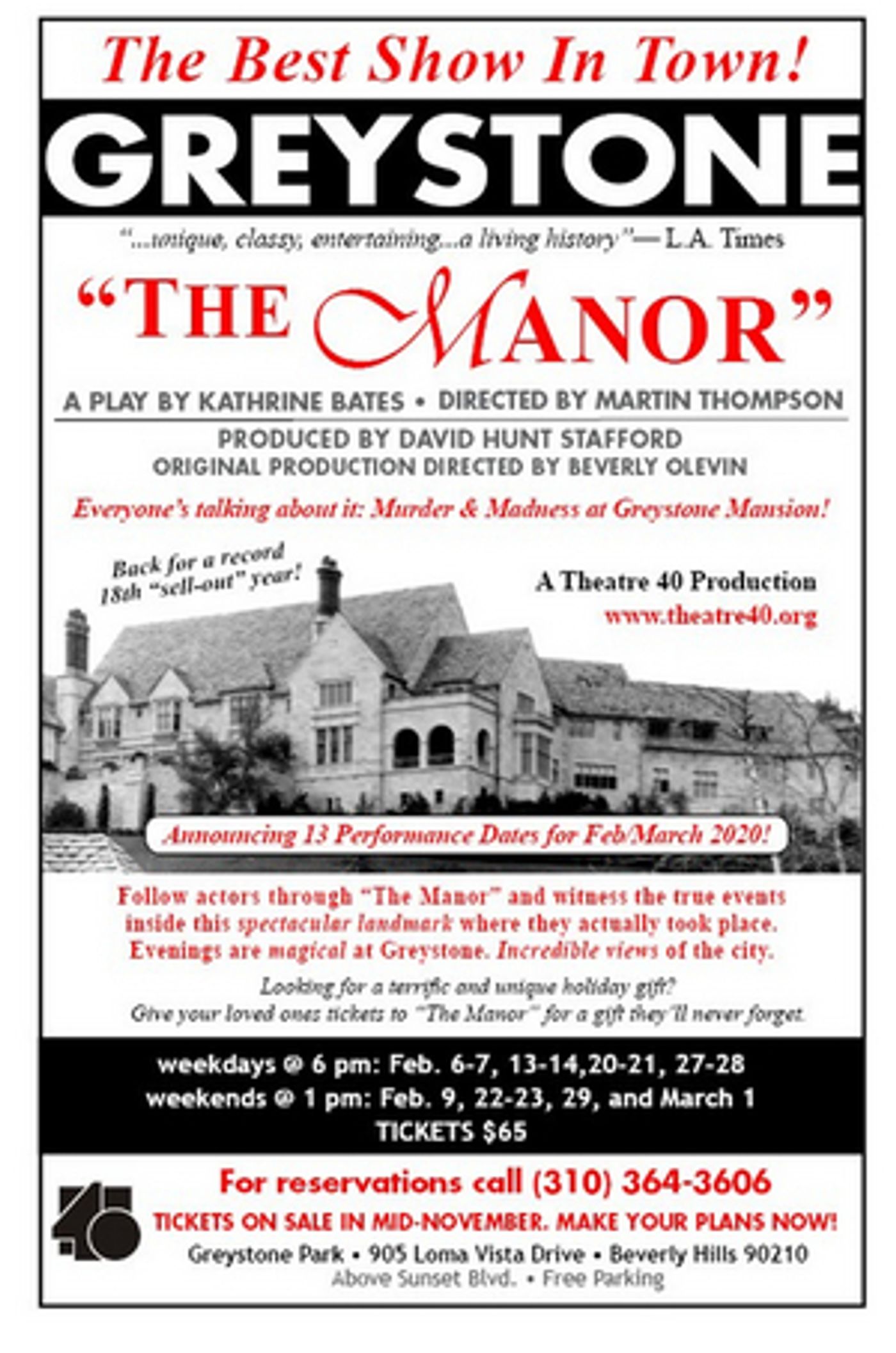
Every January I look forward to attending THE MANOR, written by Kathrine Bates and presented by Theatre 40 inside the historic Greystone Mansion in Beverly Hills where the story upon which it is based actually took place. Now celebrating its 18th year, the annual production has become a Los Angeles/Beverly Hills institution with several performances selling out even before tickets go on sale to the public. Its popularity, no doubt, is due to the scandalous true story as told by the talented actors who each inhabit their characters to a tee, costumed to time-period perfection, as well as the chance to be inside the grand and glorious architectural landmark in which the events of 91 years ago actually took place, performed in two acts taking place 10 years apart. The names of all characters in the tragic Doheny family saga have been changed, of course, "to protect the guilty" as we are told before the play begins by the mansion's loyal butler, James, portrayed this year by David Hunt Stafford who also produces the show for Theatre 40 in association with The City of Beverly Hills.
After walking through the wondrous park grounds surrounding the mansion, audience members are escorted into the grand hall "living room" of majestic Greystone, built in 1928 as a gift to Doheny's only son and heir which was a happy, family home for too short a time. The first floor rooms used for the play's scenes are marvelously decorated by the show's producer David Hunt Stafford and Jackie Petras, so be sure to notice all the small details in each room. Also of note, if you have the time to see them up close, are photos of each room as it appeared when first built in 1928 alongside a photo from the remodel in 1945.
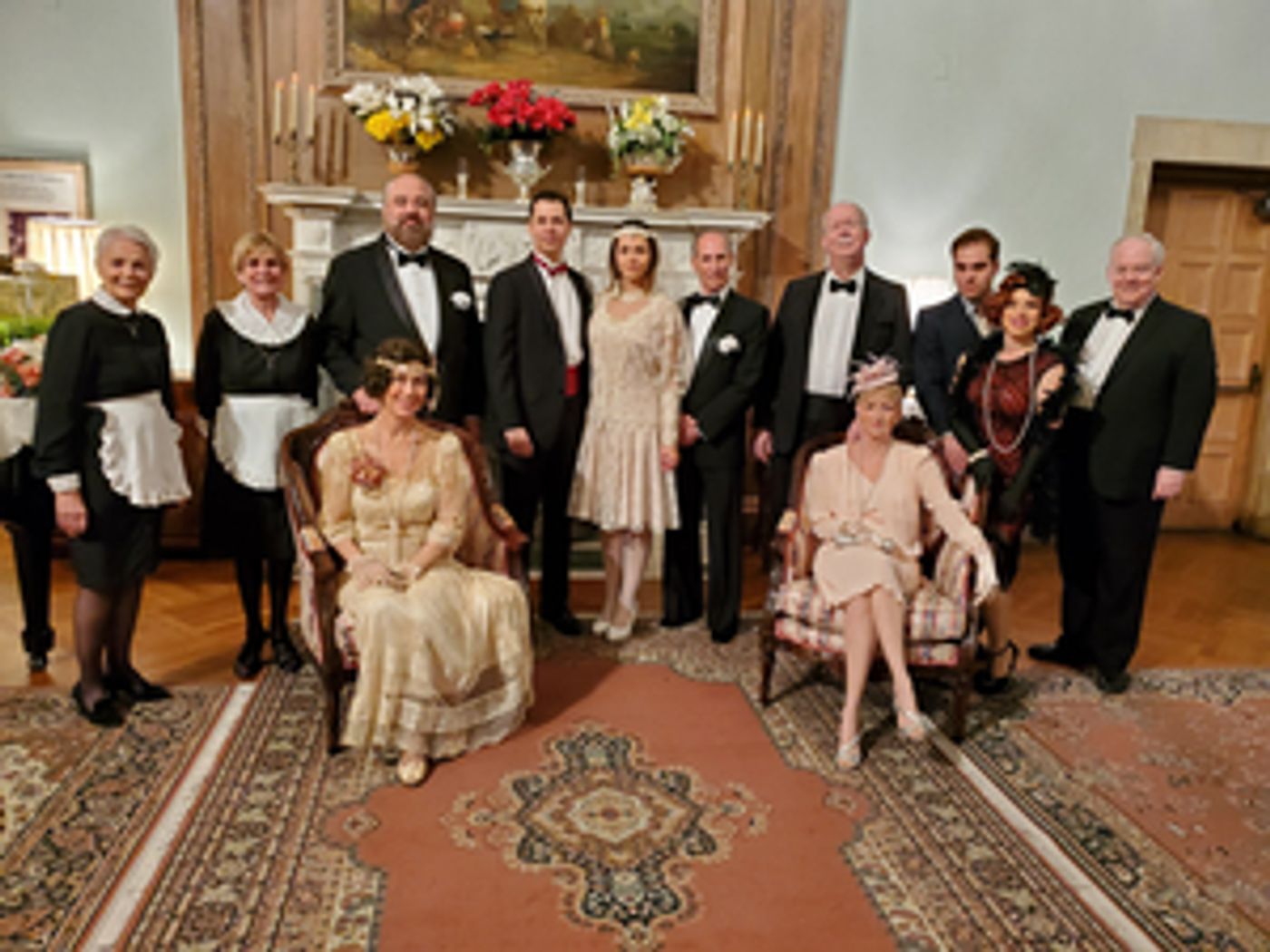 Once seated, the audience is introduced to all the players, now spirits who inhabit THE MANOR and are forced to keep reliving the joy, shock and suffering which took place within its walls. The audience is then split into 3 smaller groups and led by the household staff (David Hunt Stafford, Katherine Henryk as Ursula the housekeeper, and Esther Levy Richman as the mute maid Ellie) from room to room as different scenes of the narrative are presented, leading up to a shocking and apparent murder and suicide on the grand staircase. It does not matter in which order you see the scenes as each has been perfectly coordinated to lead into each of the others taking place.
Once seated, the audience is introduced to all the players, now spirits who inhabit THE MANOR and are forced to keep reliving the joy, shock and suffering which took place within its walls. The audience is then split into 3 smaller groups and led by the household staff (David Hunt Stafford, Katherine Henryk as Ursula the housekeeper, and Esther Levy Richman as the mute maid Ellie) from room to room as different scenes of the narrative are presented, leading up to a shocking and apparent murder and suicide on the grand staircase. It does not matter in which order you see the scenes as each has been perfectly coordinated to lead into each of the others taking place.
Again this year, director Martin Thompson has re-staged a few of the scenes, offering a better chance for the audience to be seated around and even within the action and feel more a part of what is going on as characters enter and exit scenes around them. Be sure to follow the staff quickly from room to room, and once seated keep your arms, legs and personal items out of the way so as not to trip up the actors as they move quickly around you.
 THE MANOR opens as Charles MacAlister's son Sean (Eric Keitel, returning for his second year in the role) and his new wife, Frank Parsons' lithe, lovely and totally innocent daughter Abby (Nathalie Rudolph who understudied the role last year) celebrate their marriage. The fabulously wealthy family patriarch and mining tycoon Charles MacAlister is authentically portrayed by Mark Rimer (at performances 2/6-2/22 matinee and Darby Hinton thereafter) with just the right amount of good-old-boy charm, swagger and a trusting nature even though he knows better. Rimer exudes the type of male bravado and sexiness that any woman would find too attractive not to notice!
THE MANOR opens as Charles MacAlister's son Sean (Eric Keitel, returning for his second year in the role) and his new wife, Frank Parsons' lithe, lovely and totally innocent daughter Abby (Nathalie Rudolph who understudied the role last year) celebrate their marriage. The fabulously wealthy family patriarch and mining tycoon Charles MacAlister is authentically portrayed by Mark Rimer (at performances 2/6-2/22 matinee and Darby Hinton thereafter) with just the right amount of good-old-boy charm, swagger and a trusting nature even though he knows better. Rimer exudes the type of male bravado and sexiness that any woman would find too attractive not to notice!
As we are pulled from the wedding reception to other rooms, we find out what is really going on with all the characters in private. You will see each scene, 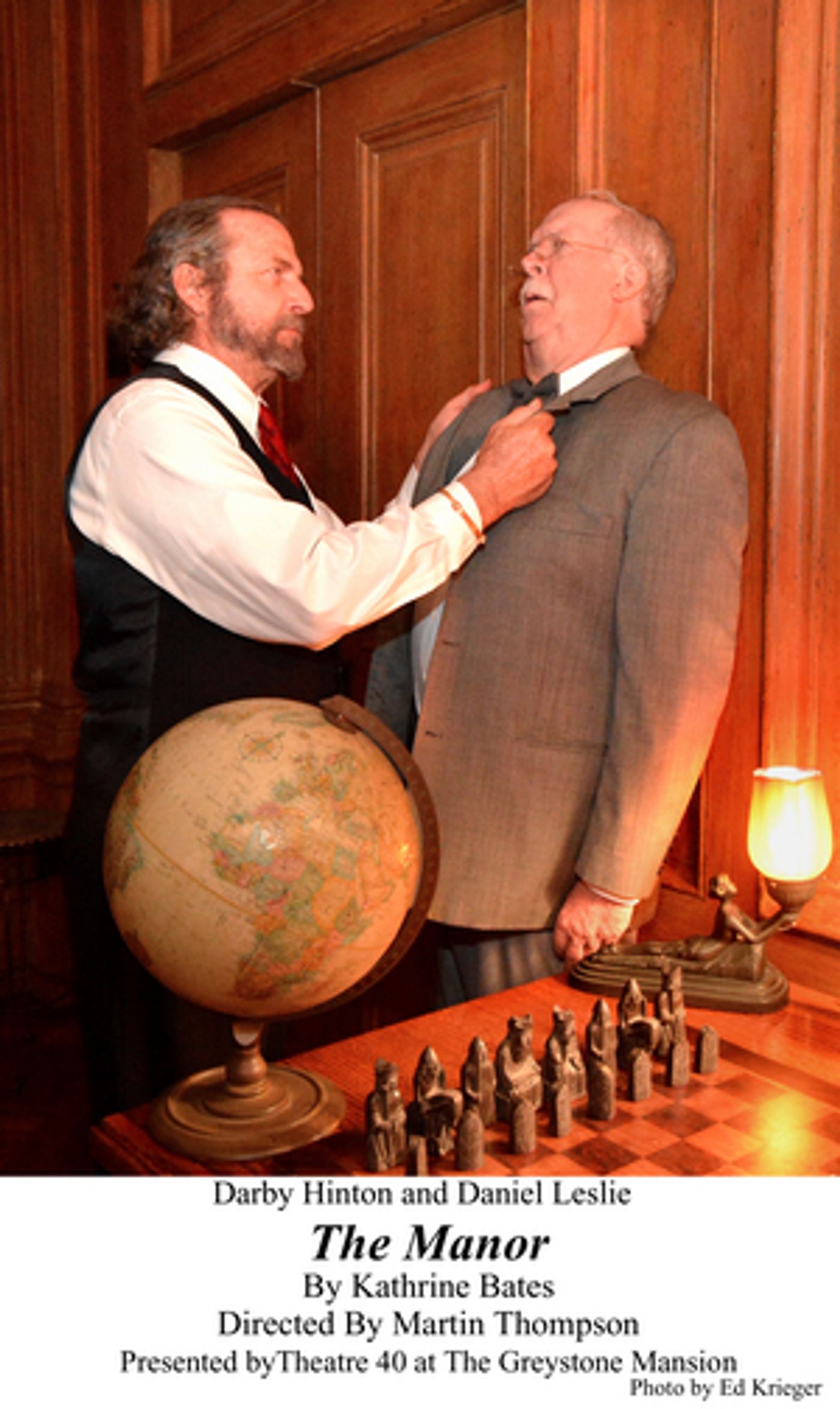 although they might be in a different order than how I mention them in this review. James the Butler will escort you into Charles' lovely wood-paneled study where he makes an illegal if well-intentioned loan to Senator Alfred Winston (a stand-in for Secretary of the Interior Albert Fall) portrayed by annual favorite Daniel Leslie as a good-old Southern boy with a serious gambling problem).
although they might be in a different order than how I mention them in this review. James the Butler will escort you into Charles' lovely wood-paneled study where he makes an illegal if well-intentioned loan to Senator Alfred Winston (a stand-in for Secretary of the Interior Albert Fall) portrayed by annual favorite Daniel Leslie as a good-old Southern boy with a serious gambling problem).
In reality, long-time friends MacAllister and Winston will soon face imminent disgrace and worse in the oncoming "Teapot Dome" bribery scandal, which engulfed the Warren Harding administration, here represented by a deal made for lucrative mining rights in exchange for building up Pearl Harbor in Hawaii. But it's the matter of a personal cash loan to Winston to pay off gambling debts, seen as a bribe to make the lucrative deal happen, that sends the two men into a lengthy and costly legal battle with the government as presented in Act 2, taking place ten years after the wedding.
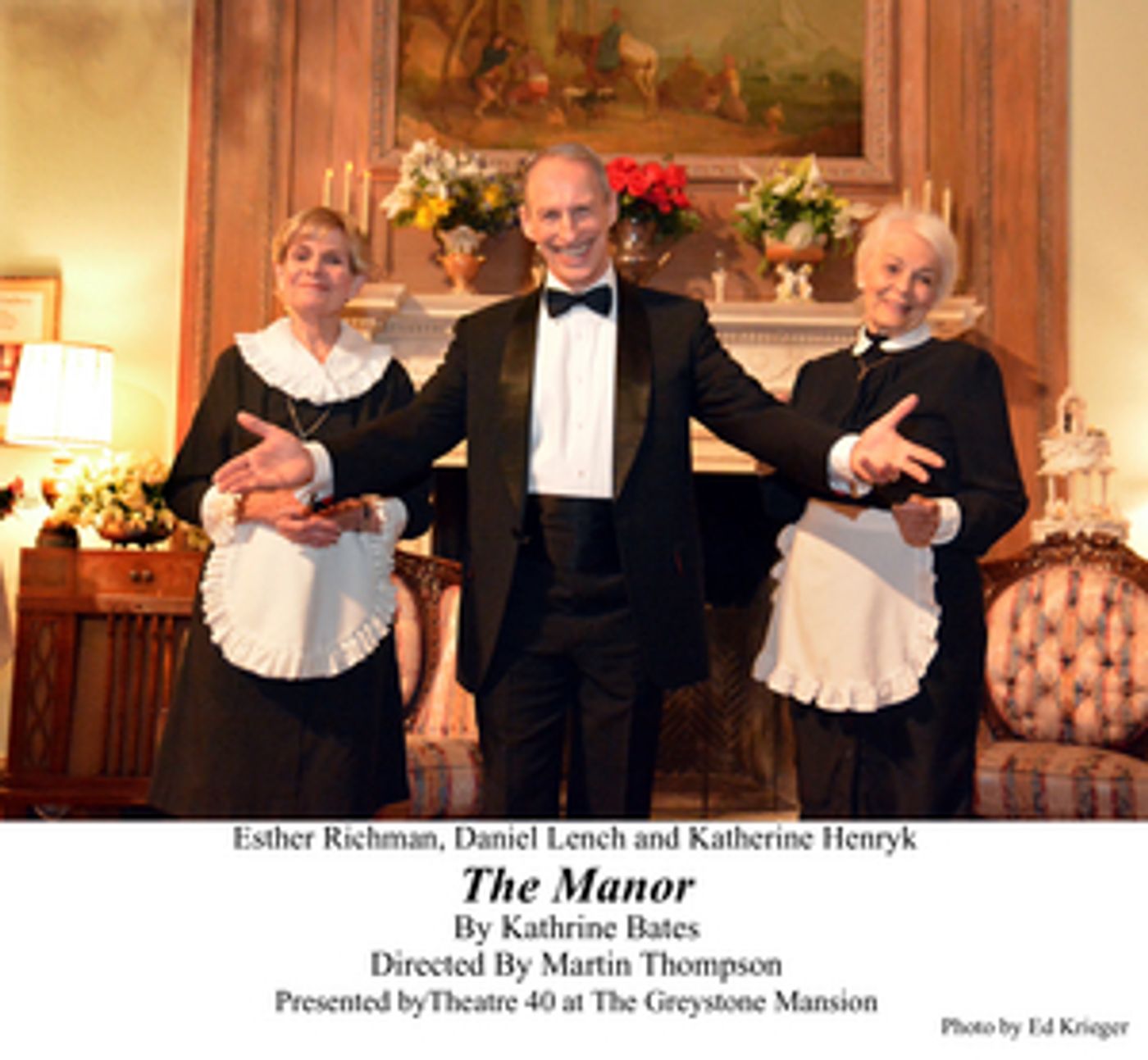 Charles MacAllister's long-time friend and lawyer, Frank Parsons, Esq., happy for the wedding of his daughter to MacAllister's son, is portrayed with a more reserved and refined nature than many of the other characters in the story by Daniel Lench, probably better known as James the Butler in previous years of the production. Director Martin Thompson, known for his wondrous character portrayals in many Theatre 40 productions, takes on the role of Parsons 2/20-2/23.
Charles MacAllister's long-time friend and lawyer, Frank Parsons, Esq., happy for the wedding of his daughter to MacAllister's son, is portrayed with a more reserved and refined nature than many of the other characters in the story by Daniel Lench, probably better known as James the Butler in previous years of the production. Director Martin Thompson, known for his wondrous character portrayals in many Theatre 40 productions, takes on the role of Parsons 2/20-2/23.
Returning to the production this year as the two men's wives are Carol Potter as Marion MacAlister and Melanie MacQueen as Cora Winston  to perfection in costumes every woman will want to take home to their own closet. Both display a bit of disdain for the other, perhaps out of jealousy but probably more so for the lack of trust each has with her husband, which eventually causes them so much social disgrace for not insisting no deal should be made. Of course, back then women were to obey and not question their husband's business dealings. And after their final scene together, it is very apparent as the Winstons leave the mansion together with their backs turned, you know they will never be invited back again. Not so for Leslie and MacQueen, married in real life, who no doubt will continue playing these two characters for as long as THE MANOR runs!
to perfection in costumes every woman will want to take home to their own closet. Both display a bit of disdain for the other, perhaps out of jealousy but probably more so for the lack of trust each has with her husband, which eventually causes them so much social disgrace for not insisting no deal should be made. Of course, back then women were to obey and not question their husband's business dealings. And after their final scene together, it is very apparent as the Winstons leave the mansion together with their backs turned, you know they will never be invited back again. Not so for Leslie and MacQueen, married in real life, who no doubt will continue playing these two characters for as long as THE MANOR runs!
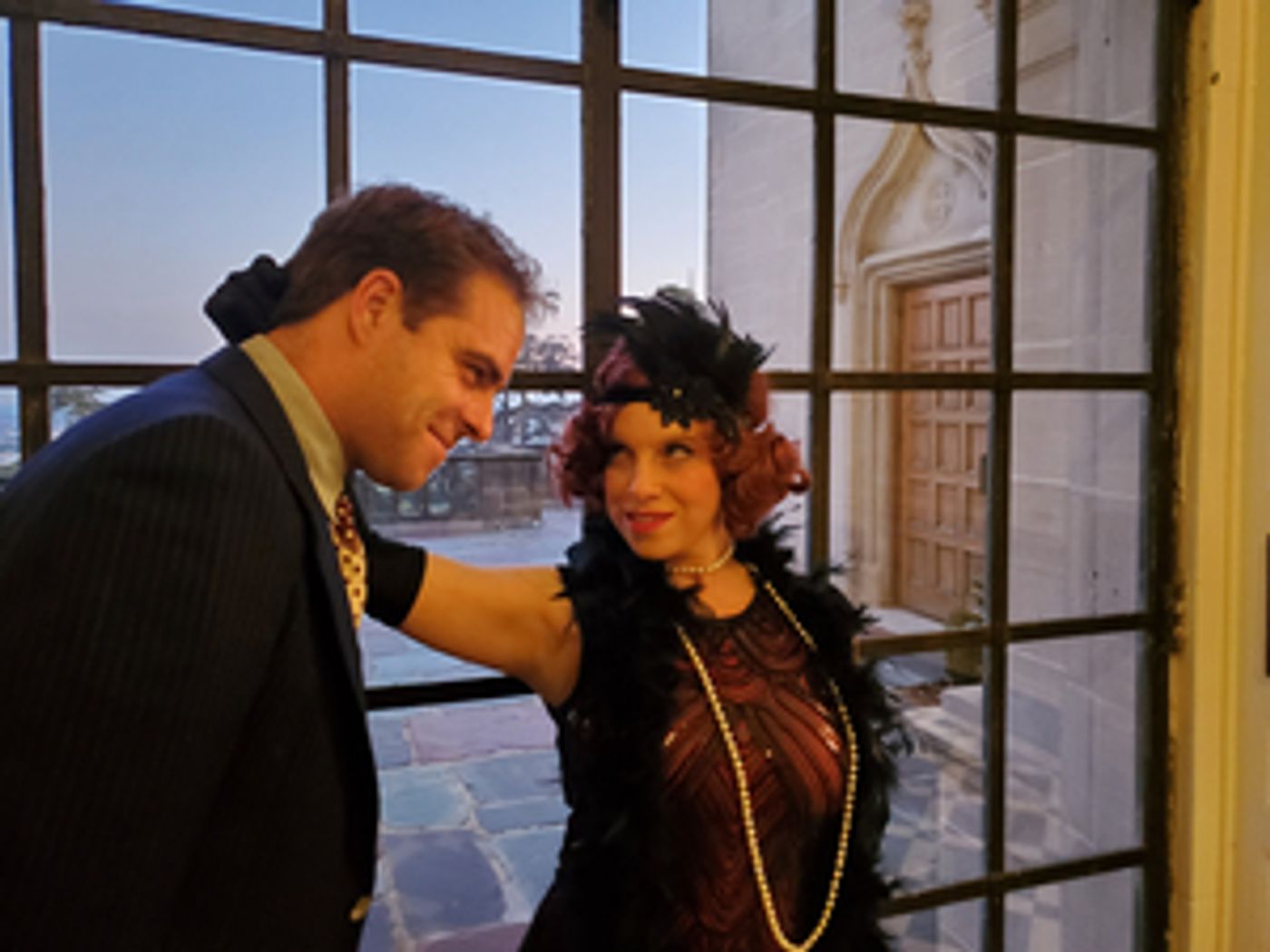 Another guest at the wedding is the handyman and Abby's jilted flame Gregory Pugh (handsome Mikel Parraga-Wells who returns for the third time and nails the role) and his flapper-entertainer wife Henrietta (newcomer Kristin Towers-Rowles whose short, red beaded dress accentuates her natural attributes) manages to flirt her way around all the men as she drops black feathers from her boa to attract even more attention to her love-starved self. That behavior is exemplified during her rendition of "Pretty Baby" accompanied by Carol Potter on the exquisite grand piano owned by the MacAllister family, upon which all the wedding gifts are stacked. Greg and Henrietta are a mismatched couple if there ever was one. So how did the two of them wind up married?
Another guest at the wedding is the handyman and Abby's jilted flame Gregory Pugh (handsome Mikel Parraga-Wells who returns for the third time and nails the role) and his flapper-entertainer wife Henrietta (newcomer Kristin Towers-Rowles whose short, red beaded dress accentuates her natural attributes) manages to flirt her way around all the men as she drops black feathers from her boa to attract even more attention to her love-starved self. That behavior is exemplified during her rendition of "Pretty Baby" accompanied by Carol Potter on the exquisite grand piano owned by the MacAllister family, upon which all the wedding gifts are stacked. Greg and Henrietta are a mismatched couple if there ever was one. So how did the two of them wind up married?
In more than one scene, we learn that Greg wanted to marry Abby but was forbidden to do so by her father who had greater plans for his daughter's financial future. It's apparent Abby really did love Greg and would have married him had her father not forbid it. She admits to still holding a special place in her heart for him, but she loves her husband and their children as well as the life they live in the family's "castle on the hill."
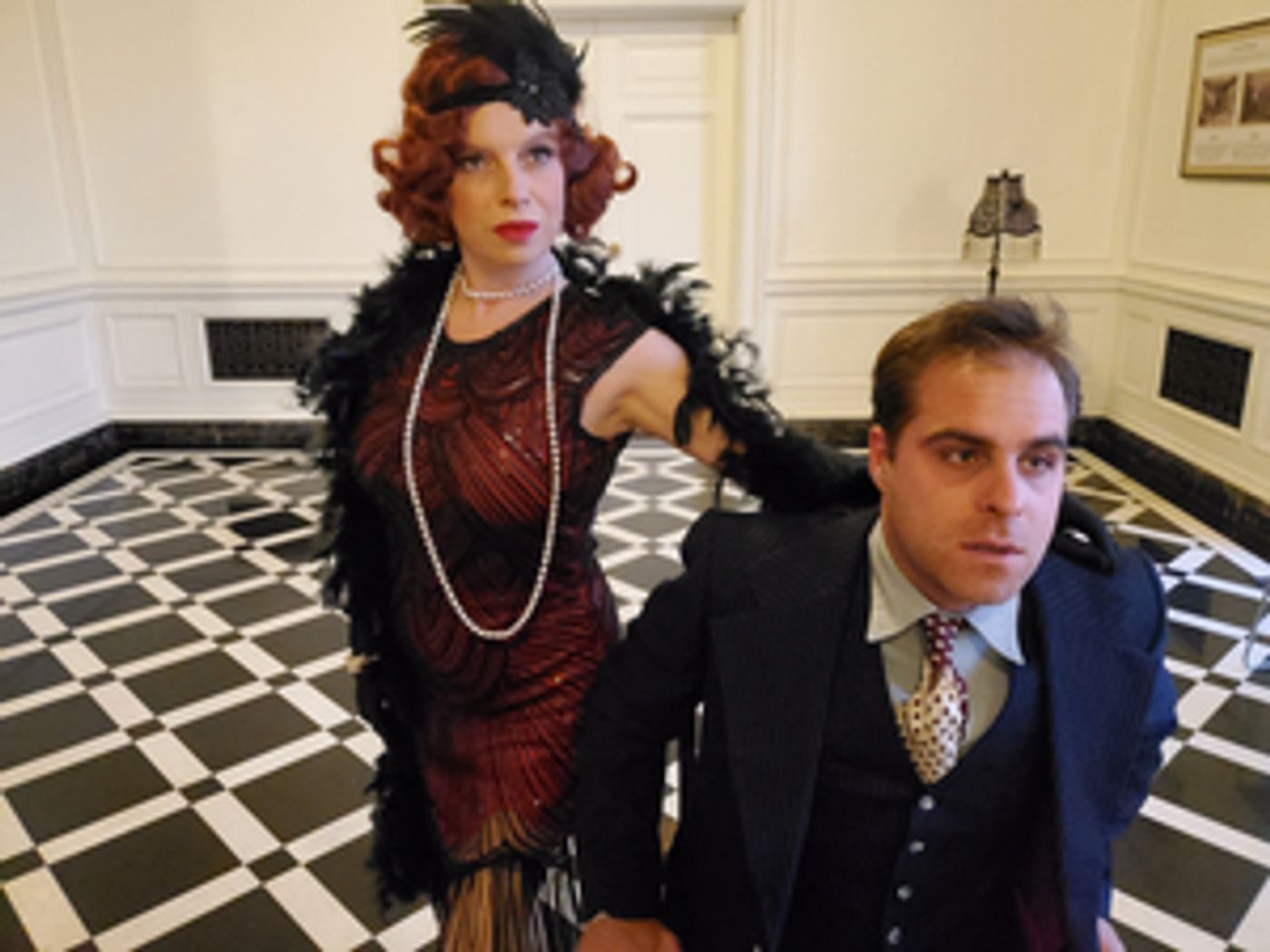 No doubt Greg's descent into alcoholism (note how his pocket flask gets larger as the play progresses) would have been avoided had he been able to marry the real love of his life rather than a gold-digger on the rebound whose only real interest in him was to further her career and gain a more stable financial future. I especially enjoyed scenes between Towers-Rowles and Parraga-Wells as they really captured the essence of this totally mismatched and constantly battling couple.
No doubt Greg's descent into alcoholism (note how his pocket flask gets larger as the play progresses) would have been avoided had he been able to marry the real love of his life rather than a gold-digger on the rebound whose only real interest in him was to further her career and gain a more stable financial future. I especially enjoyed scenes between Towers-Rowles and Parraga-Wells as they really captured the essence of this totally mismatched and constantly battling couple.
The infamous murder/suicide which took place in the mansion occurs near the end of the play, 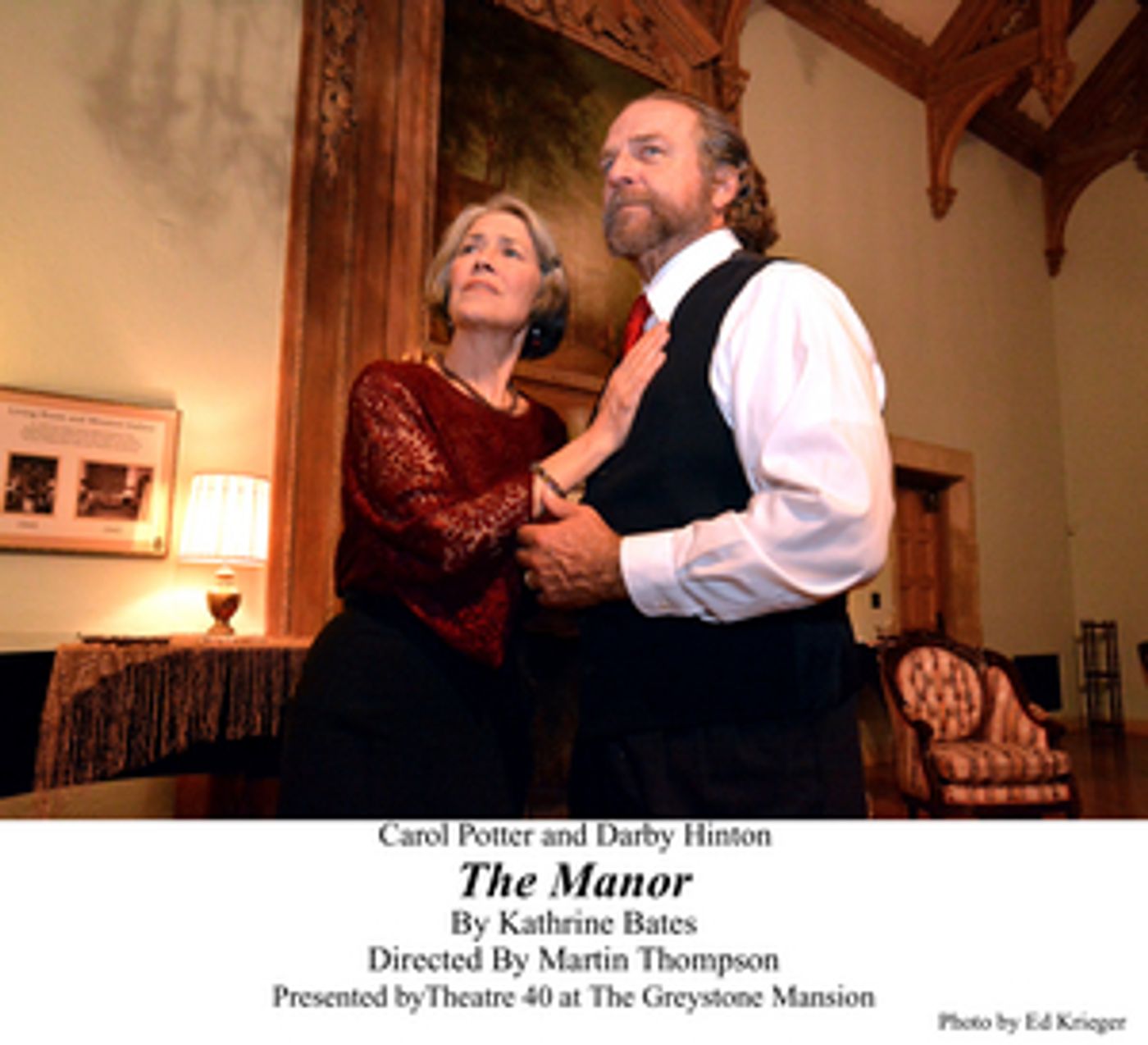 with a drunken and drugged-out Greg confronting Sean with the fact he believes Abby really loves him and refuses to believe she loves Sean for anything other than his money. But before anything is worked out, gunfire erupts and the two men lay dead on the floor. How can the MacAlister clan survive such heartbreak and sorrow? Barely, it seems, at the conclusion of the play as everyone mourns the loss of MacAlister's beloved son. It's a tale so unbelievable that if it hadn't actually happened, Hollywood (and playwright Kathrine Bates) could not have invented it.
with a drunken and drugged-out Greg confronting Sean with the fact he believes Abby really loves him and refuses to believe she loves Sean for anything other than his money. But before anything is worked out, gunfire erupts and the two men lay dead on the floor. How can the MacAlister clan survive such heartbreak and sorrow? Barely, it seems, at the conclusion of the play as everyone mourns the loss of MacAlister's beloved son. It's a tale so unbelievable that if it hadn't actually happened, Hollywood (and playwright Kathrine Bates) could not have invented it.
With very few tickets remaining for THE MANOR, please order yours ASAP to guarantee your seat at this extraordinary event through March 1. 2020, evenings beginning at 6pm on February 6, 7, 13, 14, 20, 21, 27, 28, with matinees at 1:00 p.m. on February 9, 22, 23, 29, March 1. 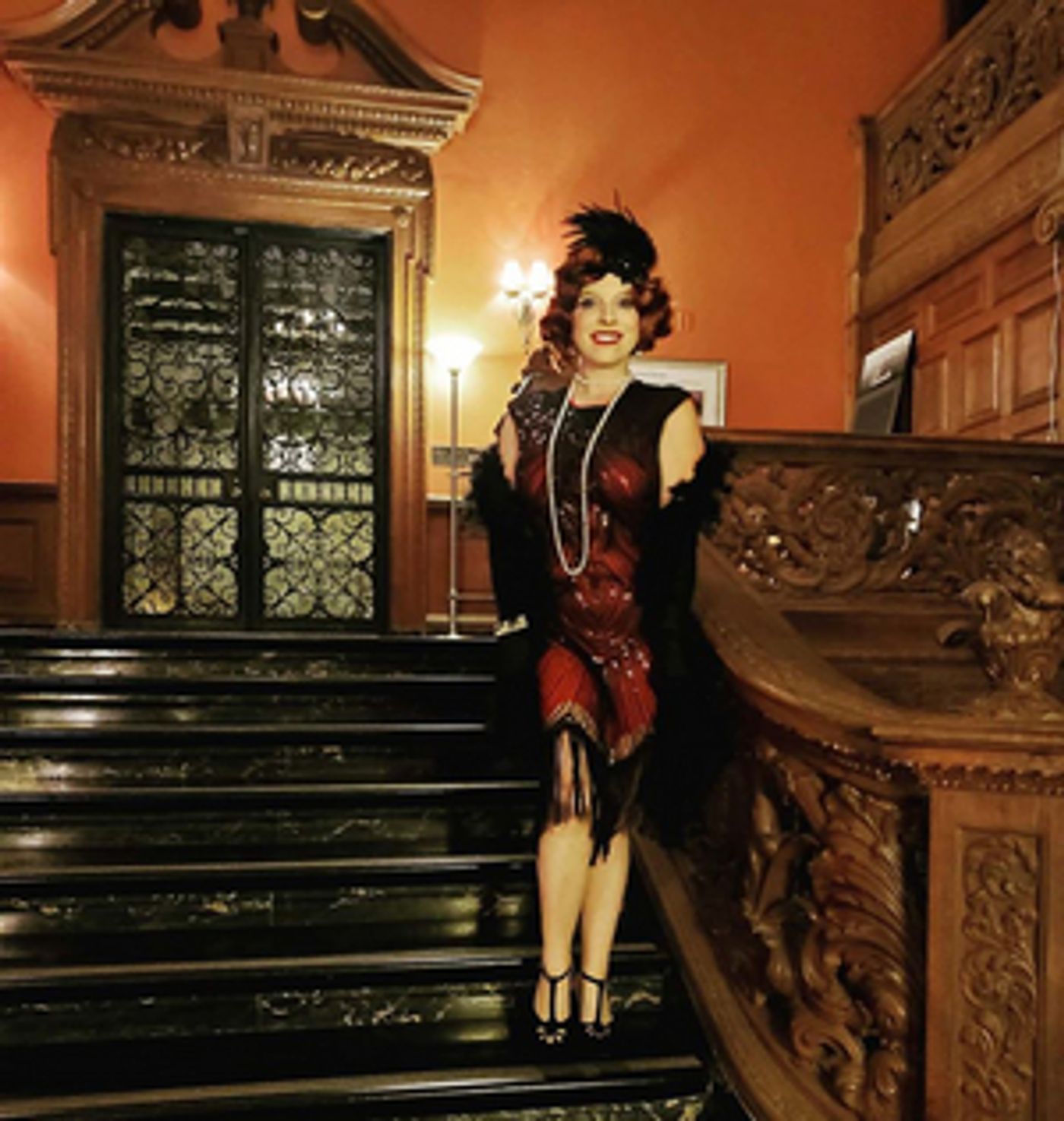 Be advised there is more availability on Thursday and Friday nights. Tickets are $65 with performances taking place within Greystone Mansion in Greystone Park, 905 Loma Vista Drive (above Sunset Blvd.), Beverly Hills, CA 90210, with free onsite parking. The performance runs approximately 2 hours 45 minutes, including a 15-minute intermission, and it is best to wear comfortable, soft-soled shoes and to bring a sweater or jacket as the mansion may get chilly on cold evenings. For more information or to purchase tickets, please call 310-364-3606 in advance to gain admittance to the show as no tickets are sold at the door. For more information, please visit www.theatre40.org
Be advised there is more availability on Thursday and Friday nights. Tickets are $65 with performances taking place within Greystone Mansion in Greystone Park, 905 Loma Vista Drive (above Sunset Blvd.), Beverly Hills, CA 90210, with free onsite parking. The performance runs approximately 2 hours 45 minutes, including a 15-minute intermission, and it is best to wear comfortable, soft-soled shoes and to bring a sweater or jacket as the mansion may get chilly on cold evenings. For more information or to purchase tickets, please call 310-364-3606 in advance to gain admittance to the show as no tickets are sold at the door. For more information, please visit www.theatre40.org
Photo credit: Ed Krieger and others
Reader Reviews
Videos

